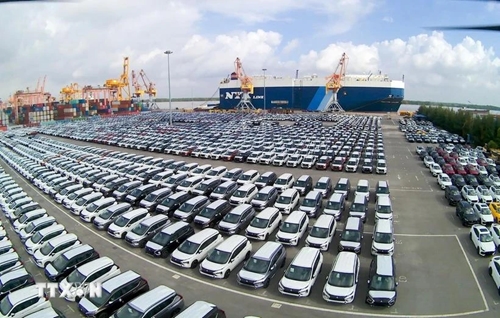Nguyen Anh Tuyet, a representative of the Vietnam Automobile Manufacturers' Association (VAMA), said the country has participated in and signed 17 FTAs, many of which include commitments related to completely built-up units (CBU) and roadmaps for cutting import tariffs on CBUs to 0%. She cited the ASEAN Trade in Goods Agreement (ATIGA), the U.K. - Vietnam FTA, the E.U. - Vietnam FTA (EVFTA), and the Comprehensive and Progressive Agreement for Trans-Pacific Partnership (CPTPP) as typical examples.
    |
 |
|
Imported cars at Hai Phong Port, the Northern city of Hai Phong |
"This is a huge opportunity for the auto market to diversify products and bring more choices to Vietnamese consumers,” Tuyet said.
She went on to say that right after Vietnam committed to abolish import and export tariffs on goods from ASEAN countries, many domestically produced products are unable to compete with rivals from regional countries such as Thailand or Indonesia.
Under the EVFTA, Tuyet went on, the tariff on CBUs imported from the E.U. will decrease by about 6.4% annually over 10 years. In 2024, it stands at 38.1% and is expected to drop to 0% in 2030.
This also puts more pressure on Vietnamese automobile manufacturers when they seek ways to maintain production and market shares in the segments they are present in, the VAMA representative said.
Le Huy Khoi, Deputy Director of the Vietnam Institute of Strategy and Policy for Industry and Trade under the Ministry of Industry and Trade, said that with quite strong commitments on automobiles, components and spare parts, especially the tariff-related ones, the EVFTA is believed to have a strong impact on Vietnam's automobile industry.
Accordingly, there will be more opportunities to import quality and high-tech cars, spare parts, and components from the E.U. at lower prices, helping cut production costs and increase vehicles' competitiveness. Besides, Vietnam has chances to export auto and motorbike spare parts and components that it can produce. It can also become investment partners or component suppliers for E.U. investors who seek to tap into the local and regional markets, he opined.
However, Khoi also pointed out some challenges the industry will face such as the high standards and geographical distance of the E.U. market, making it difficult to optimize export opportunities if businesses are not capable of engaging in supply chains or lack competitiveness.
Therefore, Vietnamese automobile enterprises need to carefully study EVFTA commitments, gear themselves up to make use of opportunities from this deal, as well as stay ready for future competition when the tariff protection roadmap ends, he noted.
According to the VAMA, car sales were on a downward trend in the first four months of this year. In the period, VAMA members sold 82,515 units, down 11% compared to 2023. Of which, the numbers of passenger cars sold decreased 14% while commercial vehicles and special-purpose ones respectively down 3% and 28%, statistics show.
Source: VNA